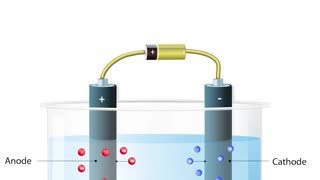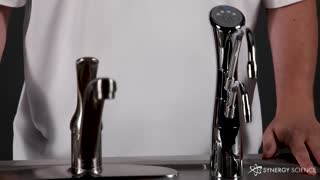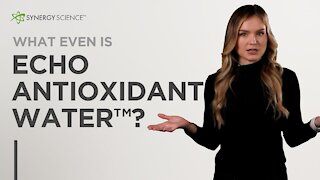Premium Only Content

Filters in the Echo Water™ Machines & What They Do
The filters provided by Synergy Science™ are among the most robust filtration processes offered in today's market. They help remove chloramines, pesticides, heavy metals, and a variety of other contaminants. All of our filters are NSF certified and operate within those rigorous standards. At Synergy Science™, it is our focus to improve the health and wellbeing of every individual.
To view and learn more about our filters, please click the following link ► https://www.synergyscience.com/product-category/replacement-filter
*Video Transcript*
"In all of the Echo water systems other than the Echo H2 Server, there is filtration built into them. So I'd like to take a moment and talk about the filtration in general and then each of the media that's in the filtration. So first of all the filters that are in the Echo Ultimate, the Echo H2 machine, they remove chlorine, chloramines, pesticides, heavy metals, including glyphosate - we have challenge tests on glyphosate where we take it to a non detectable level. We also have done a test on deuterium, a lot of people are hearing about deuterium this is simply another isotope of hydrogen. We don't create deuterium, we don't put to trim in water and we actually lower the amount of deuterium a little bit when the water passes through the Echo H2 machine and the Echo Ultimate. So what are the media in the filter? Well first of all we have tourmaline, all of the media in our filter are NSF certified - so every single one of the media's we use in our filter are NSF certified and the first one is tourmaline - now tourmaline is a gem from Asia and when it's under pressure which it would be as water is passing through a filter, it puts a piezo electric or a infrared far infrared energy into the water. The next stage is activated carbon from coconut husk - now we use a specific brand of carbon from coconut husk that is also NSF certified and has a point .1 to point .01 micron hole size, pore size - so it traps .01 micron or larger particles. This is important because Cryptosporidium, Giardia, these kind of things will be stopped in the filter. Now carbon has tremendous abilities to reduce organic contaminants in water and that's why we have a carbon from coconut husk because carbon from coconut husk is the most effective - we also use highly activated carbon. Now the next layer KDF 55, now this is an interesting media because it is made up of two metals, zinc and copper, a cathode and an anode, and it will actually absorb metal into itself. It's also known with the EPA as a anti-fungal, antibacterial, antiviral, because there is a ion exchange or what's happening in there is a cathode and an anode and there's an electrical process, it actually will absorb metal and disarm viruses, bacteria and other things, and not allow them to grow in the water. So we have this as the next layer, after that we have a highly activated and a silver activated carbon also from coconut husk that is NSF certified. So we put this filter together so that it is in specific layers in a specific order so that it's conditioning water as it goes through the filter and is able to remove the contaminants that you want and at the same time have water have that beautiful live feeling, clean feeling, when crisp feeling when you taste it. This is the filtration that we have built into the machine, the filters are designed to last 1,000 gallons, most of the time they do, if you do have a specific contaminant or your water is high in one particular contaminant, you may start to have a taste prior to the 1,000 gallons and if you do then it's time to replace the filter. This is always the way filtration goes, it's designed to last an amount of time based on gallons but water is so dynamic, water is so different in every household, in every municipality, every country, every city - you have to go by taste, when you have that new filter the water is going to taste amazing. As you go through a year you really want to change the filter and a lot of times if you haven't hit your thousand gallons by the end of a year, it's wise to replace a filter every year and not continue going even though you haven't used your full thousand gallons. I hope this is helpful for you, I also want to make sure you know how critical it is to have filtration in water because there are so many contaminants, pesticides pharmaceuticals, heavy metals, all these kinds of things in water that can harm you and it's very very very prudent and wise to remove these things out of any water before you would drink it."
Looking to keep up to date on everything Synergy Science™ has to offer? Click the links below to visit our website or follow our social media pages!
Website ► https://www.synergyscience.com
Facebook ► https://www.facebook.com/SynergyScienceInc
Instagram ► https://www.instagram.com/synergyscienceinc
LinkedIn ► https://www.linkedin.com/company/synergy-science
-
 0:59
0:59
Synergy Science
3 years ago $0.05 earnedOur Why | Synergy Science™
667 -
 2:53
2:53
Synergy Science
3 years ago $0.10 earnedKangen Water® vs. Echo Water™ Machines & Alkaline Water
709 -
 3:15
3:15
Synergy Science
3 years ago $0.01 earnedHow to Uninstall Your Echo Hydrogen Water™ Machine
63 -
 2:43
2:43
Synergy Science
3 years agoWhat exactly is Echo Antioxidant Water™? How does it work? - Tae Talks Science: Ep. 2
137 -
 LIVE
LIVE
Alex Zedra
2 hours agoLIVE! Trying to get achievements in Devour
2,072 watching -
 2:00:43
2:00:43
The Quartering
5 hours agoThe MAGA Wars Have Begun! Vivek & Elon Get Massive Backlash & Much More
50.8K16 -
 1:25:53
1:25:53
Kim Iversen
3 days agoStriking Back: Taking on the ADL’s Anti-Free Speech Agenda
40.3K15 -
 49:35
49:35
Donald Trump Jr.
8 hours agoA New Golden Age: Countdown to Inauguration Day | TRIGGERED Ep.202
123K136 -
 1:14:34
1:14:34
Michael Franzese
7 hours agoWhat's Behind Biden's Shocking Death Row Pardons?
52K36 -
 9:49
9:49
Tundra Tactical
5 hours ago $0.40 earnedThe Best Tundra Clips from 2024 Part 1.
32.3K5